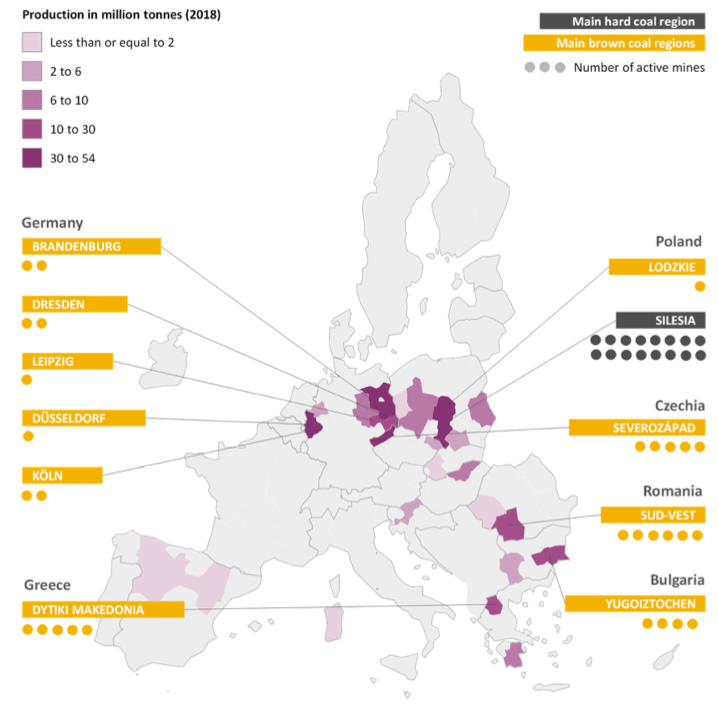EU Audit Reveals Deficiencies in Climate Change Transition Fund
Europe's largest coal-fired power plant, Belchatow Power Station, near Belchatow, Poland Dec. 5, 2018. Photo: REUTERS/Kacper Pempel
Nov. 9, 2022, the European Court of Auditors released its report on the effectiveness of the European Union’s support for phasing out coal production. The auditors hope to implement recommendations from their analysis of several EU coal-producing regions into the new iteration of climate transitioning amelioration: the Just Transition Fund (JTF).
The organization found that the EU funds had little impact on “both jobs and energy transition.” Having received a significant part of the investment, Poland was subject to much scrutiny in this report. While coal production activity declined in the country, it made up much of the loss in energy consumption with imports. Furthermore, Poland maintains the largest coal industry in the EU, employing three times as many coal workers as the other audited nations combined. The Polish inertia towards transitioning towards a climate-neutral economy in the current volatile and high-demand energy market has heightened the need for a nuanced policy framework.
The primary coal-producing regions in Poland are Upper Silesia, Malopolska, and Lubelskie. While their coal industry peaked in the late 1970s at almost half a million employed, it has managed to stave off the relative decimation found in other nations today such as Germany.
Poland still produces more than 70 percent of its energy from coal, and, consequently, the vast majority of methane emissions in the EU. The US International Trade Administration found that Poland produced almost 70 percent of all EU methane emissions from both direct coal consumption and a lack of maintenance on closed and abandoned mines. Additionally, a Polish coal power plant in Belchatow is single-handedly the “largest single air polluter in Europe,” emitting more than 1 percent of all European methane.
The primary coal-producing regions of the EU. Image: European Commission/Alves Dias, P. et al
Legally bound to the 2015 Paris Climate Agreement, the EU has reignited efforts to steer economies like Poland out of its fossil fuel dependency with the Just Transition Fund. Much of the political inertia comes from legislators in Warsaw, describing the transition as “technically impossible.”
The JTF was the European Commission’s attempt at assuaging the ruling conservative bloc in Warsaw. Valued at almost €20 billion, the JTF seeks to cushion the feared economic effects of transitioning. The Polish Union of Entrepreneurs and Employers (ZPP), a business-aligned advocacy group, expressed doubt that even though the JTF would favor Poland in its disbursements, it would nevertheless “not be sufficient to cover all costs of Poland’s energy transformation.”
While ZPP found that the JTF would be insufficient even with charitable financial assumptions, the report released on Wednesday found multiple flaws in prior climate transitioning assistance. In particular, the funds were largely used for pork-barrel, quality-of-life projects rather than investments in carbon-neutral energy infrastructure and employment training. The report also found that in the region of Malopolska, just 8 percent of funds went to renewable energy infrastructure. The auditors recommended that the JTF create coordinated timeframes and targets to ensure that funds go towards transitioning away from coal.
While the EU Commission proposed the JTF in 2020, the Russian invasion of Ukraine has since complicated the transition from coal. With Russian President Vladimir Putin constraining the supply of natural gas and oil to the EU, many nations struggle to balance their long-term climate goals with short-term price volatility in energy markets.
Poland leads the support for the upcoming EU price cap plan that seeks to alleviate the effects on its citizens and indirectly give its coal industry more leverage in supplying the European market at large. To the joy, perhaps, of the beneficiaries of the Polish coal industry, the audit concluded that “Russia’s invasion of Ukraine in 2022… may also result in delays in the transition away from coal.”


